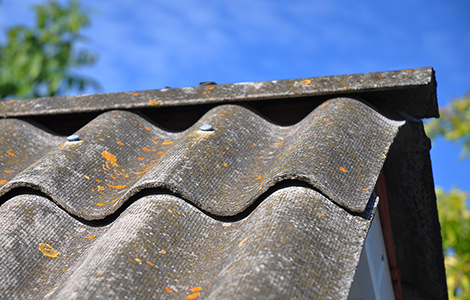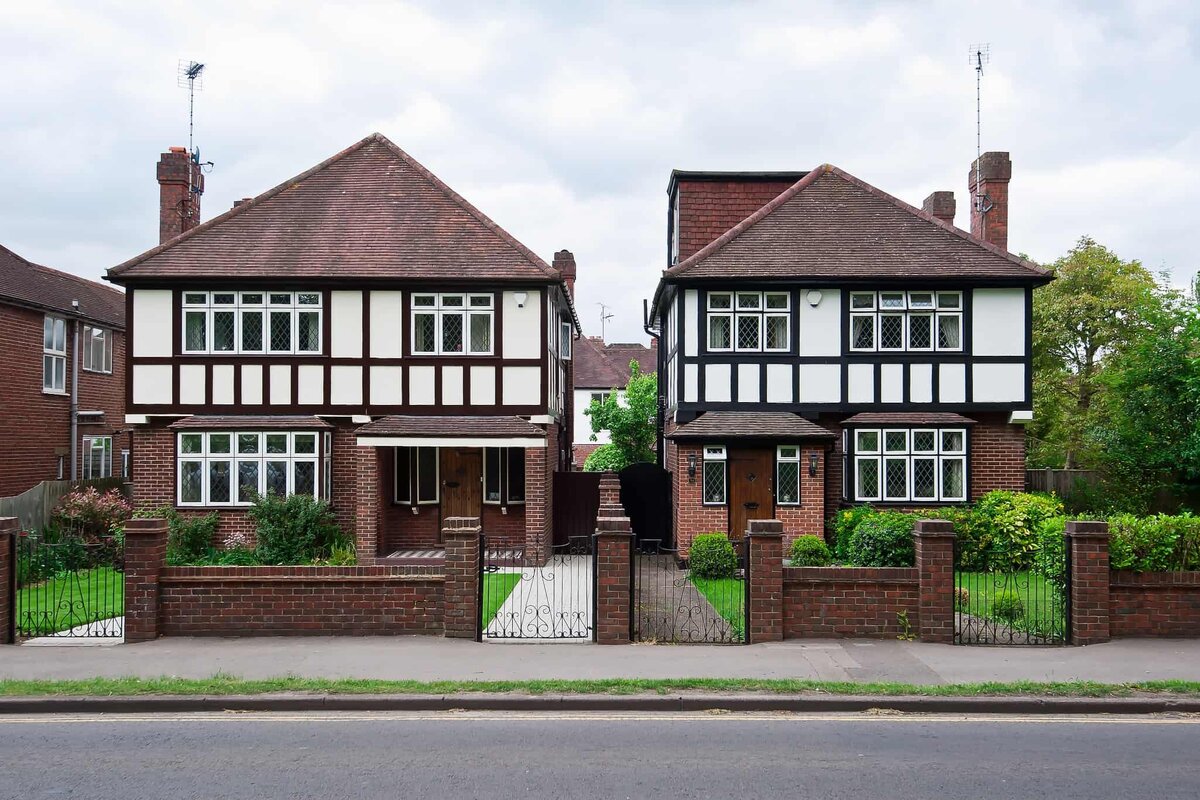Hearing the word asbestos strikes fear into the hearts of most buyers. Once widely used as a building material, it can now be a dealbreaker for some lenders and can actually stop buyers from getting mortgage approval. With more than 1.5 million buildings across the UK containing asbestos, it's more common than you may think. While the discovery of asbestos is undoubtedly worrying, the good news is that there are lenders that will still consider approving mortgages for properties with asbestos if you’re advised not to get it removed. This guide will look at everything you need to know about asbestos and what it might mean for getting a mortgage.
The Topics Covered in this Article Are Listed Below:
- What Is Asbestos?
- Why Is Asbestos Dangerous?
- Do You Need to Remove Asbestos?
- Where Can Asbestos Be Found in the Home?
- Which Properties Are Most Likely to Contain Asbestos?
- Can I Get a Mortgage on a House with Asbestos?
- How Much Does It Cost to Remove Asbestos from a Property?
- Why Does Asbestos Make It Harder to Get a Mortgage?
- Which Lenders Will Approve Mortgages for Properties with Asbestos?
- How Can I Confirm Whether a Property Has Asbestos?
- What Should I Do if There’s Asbestos in the Property I Want to Buy?
- Can I Get a Mortgage if I Remove the Asbestos?
- Can I Get a Mortgage for a House with Asbestos if a Lender Has Previously Declined My Application?
- Can I Get a Mortgage for an Asbestos Roof?
- Can I Sell My Home if It Has Asbestos?
- Can the Presence of Asbestos Affect Property Prices?
- Can Asbestos Stop a Property Sale from Going Ahead?
- Should I Buy a House if It Has Asbestos?
- Can I Rent Out My Property if It Has Asbestos?
- Asbestos and Mortgages: The Bottom Line
What Is Asbestos?

Asbestos is the collective name for 6 naturally occurring fibrous materials. The most commonly known - and most dangerous - are white asbestos (chrysotile), brown asbestos (amosite) and blue asbestos (crocidolite). Asbestos became a popular building material in the 19th century, as its fibrous properties were resistant to heat, fire, electrical and chemical damage and were good for sound absorption.
Why Is Asbestos Dangerous?
Materials that contain asbestos may release fibres when disturbed, improperly removed or damaged. Exposure to these asbestos fibres can aggravate your lungs and cause scarring and shortness of breath, known as Asbestosis. This is a serious, non-cancerous respiratory disease that can be fatal with prolonged exposure over some time.
Do You Need to Remove Asbestos?
Health and Safety regulations advise that if the asbestos is non-friable and undamaged, it's generally best to leave it in place. Removal can create far more health risks by releasing fibres into the atmosphere. If you come across existing asbestos while renovating your home, stop work immediately and contact a specialist asbestos contractor to carry out a risk assessment.
Where Can Asbestos Be Found in the Home?
It's common to find asbestos in residential properties where it's been mixed with other materials for strength, such as corrugated roofing, cement sheeting or decorative wall coatings like Artex. It's also commonly found around boilers, behind fuse boxes, airing cupboards, ceiling and floor tiles, loose-fill insulation, pipe lagging, water cisterns and gas pipes.
Which Properties Are Most Likely to Contain Asbestos?
While brown and blue asbestos were already banned in the UK by 1985, white asbestos, commonly used in the UK's homebuilding industry, was only outlawed in 1999. Houses that have been built since that time don't contain any asbestos. However, if you buy a pre-1999 property, you need to be wary. For instance, Arctex was still being manufactured with white asbestos until the mid-1980s, while the asbestos ceiling and floor tiles were very popular during the 1950s and 60s.

Can I Get a Mortgage on a House with Asbestos?
Obtaining a mortgage on a house with asbestos present can be challenging, but it is not impossible.
With the number of homes in the UK that have some trace of asbestos, it is possible to find a mortgage. However, in most cases, a mortgage offer will depend on where the asbestos is in the property and the probability of it being disturbed. Each lender has their own set criteria for approving mortgages on properties with asbestos. For some lenders, their decision will be based on what the qualified surveyor reports in terms of risks.
Here are some key points to consider:
- Lender requirements - mortgage lenders may have specific requirements or restrictions regarding properties with asbestos. Some lenders may refuse to provide financing for properties with known asbestos-containing materials (ACMs), while others may require proof of asbestos remediation or mitigation before approving a mortgage
- Property condition - the condition and location of the ACMs within the property can influence the lender's decision. If the asbestos is intact and not posing a health risk, lenders may be more willing to consider financing. However, if the asbestos is damaged, deteriorating, or likely to be disturbed during renovation or demolition, lenders may have reservations
- Asbestos assessment - lenders may require an asbestos assessment or inspection to determine the extent of asbestos presence and any associated risks. A qualified asbestos inspector can assess the condition of the materials, recommend appropriate measures for management or removal and provide documentation to satisfy lender requirements
- Remediation or removal - depending on the lender's requirements and the extent of asbestos present, remediation or removal may be necessary before securing a mortgage. Remediation involves managing and ACMs materials to prevent exposure, while removal entails safely removing and disposing of the materials. Costs for remediation or removal can vary depending on factors such as the size of the property, the extent of asbestos present and the chosen method of abatement.
- Disclosure requirements - sellers are typically required to disclose the presence of asbestos to potential buyers. Failing to disclose asbestos may lead to legal liabilities and affect the sale process. Buyers should conduct thorough inspections and assessments to identify any asbestos-related issues before proceeding with a purchase
- Insurance considerations - homeowners insurance policies may have exclusions or limitations related to asbestos-related claims. Buyers should review their insurance coverage carefully and consider obtaining specialised coverage or endorsements for asbestos-related risks
Overall, while it may be more challenging to secure a mortgage on a property with asbestos present, it's not impossible with proper assessment, remediation, and documentation.
How Much Does It Cost to Remove Asbestos from a Property?
The cost of removing asbestos from a property in the UK can vary widely depending on the type of asbestos, how much needs to be removed, and where it is located.
For smaller jobs, such as removing asbestos garage roof sheets or floor tiles, you might expect to pay anywhere from £300 to £1,000. For more extensive work inside a property, especially if the asbestos is in the insulation of ceilings or walls, costs can rise significantly, often reaching several thousand pounds.
Asbestos removal must be carried out by licensed professionals, especially if the material is friable (easily crumbled) or in poor condition. There may also be additional costs for surveys, waste disposal and making the area safe afterwards.
Before starting any renovation or demolition work, it is important to get an asbestos survey and a clear quote from a licensed contractor.
Why Does Asbestos Make It Harder to Get a Mortgage?

Removing asbestos can be expensive and time-consuming, so lenders will factor this additional cost into the property valuation. Also, if they have to repossess the property in the future, having asbestos in the property will make it more difficult to sell. These issues, along with the serious health risks and the impact of asbestos on property prices, can make many mortgage lenders cautious when it comes to offering mortgages on these properties.
Many lenders do recognise that the risks largely depend on where the asbestos is in the property and the likelihood of it being disturbed. Each lender will have specific criteria for whether a property with asbestos is mortgageable.
Some lenders and mortgage brokers will find it challenging to provide a mortgage where asbestos is concerned; you may also need to consider whether your home is subject to non-standard construction, so it's important to discuss Non-Standard Construction mortgages with a specialist mortgage broker like John Charcol.
Which Lenders Will Approve Mortgages for Properties with Asbestos?
Several mortgage lenders will let you borrow on a property with asbestos. High-street lenders such as Natwest, Santander and Nationwide are generally willing to offer mortgages on these types of properties. TSB will consider lending on homes with asbestos if it's not present in load-bearing structures. Meanwhile, Barclays will turn down applications on properties where the asbestos is found to pose serious health risks or significantly impacts the property's value.
However, some high-street banks will automatically decline applications for mortgages on properties with asbestos - such as Virgin Money, Metro Bank and Coventry Building Society.
It's important to remember that being rejected for a mortgage will mark your credit report. Therefore, you should avoid applying for a mortgage from lenders who don't accept properties with asbestos if you’re not having the asbestos removed. An independent mortgage broker like John Charcol will be able to advise you on the best mortgages for properties with asbestos.
How Can I Confirm Whether a Property Has Asbestos?
An asbestos survey will determine whether a property has asbestos, the degree of risk and whether it is likely to be disturbed. A qualified surveyor from RSPH, ATAC, UKAS or UKATA will carry out a check on the property.
If the asbestos mortgage survey determines that there's a likelihood that the asbestos will become airborne and pose a health risk to those living on the property, some lenders automatically decline your application. Others will consider the surveyor's findings but will only lend to you if the property has load-bearing asbestos panels, or the asbestos is undisturbed.
What Should I Do if There's Asbestos in the Property I Want to Buy?
If a survey has found asbestos in the property you’re hoping to buy, don't worry just yet. There are several things you can do to improve your chances of getting a mortgage.
Asbestos Survey
You may need to arrange for a specialist to take samples from the property and conduct a more detailed asbestos survey than a basic home report provides. Some mortgage lenders will insist on a completed specialist survey before making a decision regarding your application. The resulting survey will tell you how much asbestos there is in the property, where it is, the risks it poses and how much work is required to make the property safe.
Once you've received the survey, you may decide that the repair work will be too expensive or the health risk is too high to continue purchasing the property. However, if the risk appears to be low and you’re still interested in the property, you may be able to use the asbestos mortgage survey results to negotiate a lower purchase price.
Removing the Asbestos
Removing asbestos can be a very expensive task, so you may want to decide whether it’s actually required even if it’s determined safe to do. An asbestos survey will be able to tell you this. You might be able to negotiate with the seller to reduce the asking price to take into account all, or at least some, of the cost of removing the asbestos. Never attempt to remove the asbestos yourself — this should be undertaken by a certified professional.
Can I Get a Mortgage if I Remove the Asbestos?
If the surveyor identifies asbestos in the property and doesn’t see it as an issue and doesn’t recommend removing it, then you stand a good chance of the lending accepting your application. If the surveyor recommends remedial work to remove the asbestos, then the lender won’t accept your mortgage application until the asbestos is taken care of. In this circumstance, you, your solicitors or your estate agents would contact the seller to see if this is something they’d consider doing and paying for. It's a good idea to get advice from an independent mortgage broker who has expertise in finding asbestos mortgage lenders if you think this may be required.
Can I Get a Mortgage for a House with Asbestos if a Lender Has Previously Declined My Application?
Even though one lender may reject your mortgage application because of asbestos, this doesn't necessarily mean others will refuse it too. One of our expert advisers will be able to look at your options and help you find the right lender for your circumstances.
Can I Get a Mortgage for an Asbestos Roof?
A house that has a roof containing asbestos is usually less of an issue for most lenders compared with properties where asbestos is part of the core fabric of the building. Many lenders will approve a mortgage application if the roof itself isn't damaged and is in good condition. It's still recommended to get a survey done on the property and roof to determine if the asbestos should be removed.
Can I Sell My Home if It Has Asbestos?
You can sell a property that has asbestos, but you must disclose it to all potential buyers. If there's only a small risk, there shouldn't be much of an impact on your property's value. It's not uncommon for a homeowner to be unaware that asbestos is present in their home until a chartered surveyor picks it up. If this initial investigation fails to detect asbestos and the home is subsequently sold, both the estate agent and the surveyor could be liable for prosecution. That's why surveyors and estate agents are extremely mindful about detecting asbestos during the survey and valuation.
Before you sell, consider removing the asbestos if the survey shows that it may pose a significant risk. This should be done by an experienced contractor who has the skills and protective wear required to carry out the removal. Don't attempt to handle, disturb or remove asbestos yourself.
Can the Presence of Asbestos Affect Property Prices?
Asbestos can impact property value. The extent to which it will do this will depend on where the asbestos is in the property, how much there is and its condition. With the costs of removing asbestos being very high, it's common for property prices to be adjusted to reflect this.
Sellers should consider getting a professional to remove it rather than dropping the sale price. From a buyer's standpoint, they might be able to negotiate a lower purchase price in light of the discovery of asbestos in the property and the associated costs of removing it.
Can Asbestos Stop a Property Sale from Going Ahead?
In certain situations, the presence of asbestos in a property can put the brakes on a sale. However, it will largely depend on several factors - such as the condition of the asbestos, where it is in the property and the buyer's attitude towards it being there. Even if a survey determines that it's safe, the mere presence of asbestos in a property can be enough to put some people off purchasing. From a legal point of view, there's nothing stopping someone from selling a property with asbestos, but they are obliged to disclose it to the buyer.
Should I Buy a House if It Has Asbestos?
Discovering that the house you’re looking to buy has asbestos is understandably worrying. After all, the serious health implications of asbestos are now widely known. While just hearing the word "asbestos" can be alarming, the most important thing to consider is whether or not the asbestos is exposed and if people could come into contact with it.
For instance, if the asbestos is in the roof and is unlikely to be disturbed, it’s usually safe and presents minimal risk. If the survey on a house you want to buy has flagged asbestos, the best thing to do is organise for a specialist contractor to assess the risk. This can be expensive, but it's worth it, even just for peace of mind.
If the survey shows that there's not much asbestos present and the work required to make the property safe is minimal, then the presence of asbestos need not deter you from buying the property but you will want to consider the implications if you intend to sell later on. However, if the survey finds large amounts of asbestos, the cost for either removing it or making the property safe could be thousands of pounds, which could mean you may want to rethink the purchase.
Can I Rent Out My Property if It Has Asbestos?

You can rent out a property that has asbestos but you must minimise your tenant's asbestos exposure risk as much as possible. You'll need to organise an asbestos survey to determine the extent of the asbestos and the degree of risk.
If the survey determines that the asbestos is safe and it is best to leave it undisturbed, you are not obliged to have it removed in order to rent out the property.
If you fail to monitor and maintain the asbestos appropriately, your tenants may decide to raise it with the local authority, or even sue you for breach of contract.
Asbestos and Mortgages: The Bottom Line
Contact our independent mortgage experts if you’re looking to purchase a property with suspected asbestos, or if you have any questions about getting a mortgage on a property with known asbestos.
At John Charcol, we have access to a broad range of lenders and mortgages - including the best deals and specialist lenders - so be assured we can help you find the right asbestos mortgage. Get in touch with us today on 0330 433 2927 or submit an online enquiry.
First-Time Buyer Mortgages
Discover the best first time buyer mortgage rates available and the latest advice from John Charcol: mortgage broker for first time buyers.
Applying for a Mortgage
Applying for a mortgage couldn’t be simpler with our easy and simple guide from application to accepting your offer.
How Much Can I Borrow?
This mortgage calculator examines your income and works out how much money a mortgage lender might provide you with
House Buying Mortgage Guide
Are you looking to buy your first home? Or perhaps want to move to a new area? Our step-by-step guide will tell you everything you need to know about buying a house.
Mortgage Deposit Guide
How much deposit will you need for your mortgage? We explain how mortgage deposits work, what LTV is, how your deposit affects your mortgage and more.
Mortgage with Contaminated Land
Learn how to get a mortgage with contaminated land, what counts as contaminated land, how to find out if land is contaminated and more.
Funding Home Improvements
There are a few ways to finance work on a house: get a home improvement loan, remortgage for home improvements, ask your lender for a further advance & more
Types of Houses
There are a few common types of houses in the UK. This guide explains how they’re different, as well as how they can affect your mortgage and insurance needs.
Mortgage Glossary
On this page you’ll find our detailed mortgage terminology glossary. There’s a lot of jargon out there but we’re here to make it easy.

